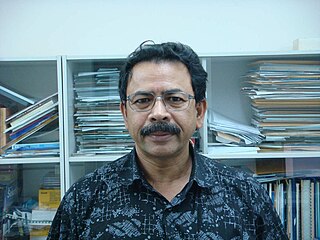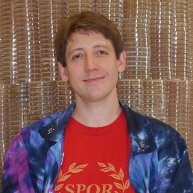Related Research Articles

A bacteriophage, also known informally as a phage, is a duplodnaviria virus that infects and replicates within bacteria and archaea. The term was derived from "bacteria" and the Greek φαγεῖν, meaning "to devour". Bacteriophages are composed of proteins that encapsulate a DNA or RNA genome, and may have structures that are either simple or elaborate. Their genomes may encode as few as four genes and as many as hundreds of genes. Phages replicate within the bacterium following the injection of their genome into its cytoplasm.

Salvador Edward Luria was an Italian microbiologist, later a naturalized U.S. citizen. He won the Nobel Prize in Physiology or Medicine in 1969, with Max Delbrück and Alfred Hershey, for their discoveries on the replication mechanism and the genetic structure of viruses. Salvador Luria also showed that bacterial resistance to viruses (phages) is genetically inherited.

Phage therapy, viral phage therapy, or phagotherapy is the therapeutic use of bacteriophages for the treatment of pathogenic bacterial infections. This therapeutic approach emerged at the beginning of the 20th century but was progressively replaced by the use of antibiotics in most parts of the world after the Second World War. Bacteriophages, known as phages, are a form of virus that attach to bacterial cells and inject their genome into the cell. The bacteria's production of the viral genome interferes with its ability to function, halting the bacterial infection. The bacterial cell causing the infection is unable to reproduce and instead produces additional phages. Phages are very selective in the strains of bacteria they are effective against.

Richard Eimer Lenski is an American evolutionary biologist, a Hannah Distinguished Professor of Microbial Ecology, Genetics and Evolution, and Evolution of Pathogen Virulence at Michigan State University. He is a member of the National Academy of Sciences and a MacArthur Fellow. Lenski is best known for his still ongoing 35-year-old long-term E. coli evolution experiment, which has been instrumental in understanding the core processes of evolution, including mutation rates, clonal interference, antibiotic resistance, the evolution of novel traits, and speciation. He is also well known for his pioneering work in studying evolution digitally using self-replicating organisms called Avida.
Bacteriophages (phages), potentially the most numerous "organisms" on Earth, are the viruses of bacteria. Phage ecology is the study of the interaction of bacteriophages with their environments.

Gunther S. Stent was Graduate Professor of Molecular Biology at the University of California, Berkeley. One of the early bacteriophage biologists, he was known also for his studies on the metabolism of bacteria and neurobiology of leeches, and for his writing on the history and philosophy of biology.
Experimental evolution studies are a means of testing evolutionary theory under carefully designed, reproducible experiments. Given enough time, space, and money, any organism could be used for experimental evolution studies. However, those with rapid generation times, high mutation rates, large population sizes, and small sizes increase the feasibility of experimental studies in a laboratory context. For these reasons, bacteriophages are especially favored by experimental evolutionary biologists. Bacteriophages, and microbial organisms, can be frozen in stasis, facilitating comparison of evolved strains to ancestors. Additionally, microbes are especially labile from a molecular biologic perspective. Many molecular tools have been developed to manipulate the genetic material of microbial organisms, and because of their small genome sizes, sequencing the full genomes of evolved strains is trivial. Therefore, comparisons can be made for the exact molecular changes in evolved strains during adaptation to novel conditions.

Günter P. Wagner is an Austrian-born evolutionary biologist who is Professor of Ecology and Evolutionary biology at Yale University, and head of the Wagner Lab.
Nancy A. Moran is an American evolutionary biologist and entomologist, University of Texas Leslie Surginer Endowed Professor, and co-founder of the Yale Microbial Diversity Institute. Since 2005, she has been a member of the United States National Academy of Sciences. Her seminal research has focused on the pea aphid, Acyrthosiphon pisum and its bacterial symbionts including Buchnera (bacterium). In 2013, she returned to the University of Texas at Austin, where she continues to conduct research on bacterial symbionts in aphids, bees, and other insect species. She has also expanded the scale of her research to bacterial evolution as a whole. She believes that a good understanding of genetic drift and random chance could prevent misunderstandings surrounding evolution. Her current research goal focuses on complexity in life-histories and symbiosis between hosts and microbes, including the microbiota of insects.

Shah Mohammad Faruque is a professor in the School of Environment and Life Sciences at Independent University Bangladesh (IUB). He is widely recognized for his research in Vibrio cholerae, the bacterium which causes the epidemic diarrhoeal disease Cholera. Among other positions, previously he was a professor at BRAC University; director of the Genomics Centre at the International Centre for Diarrhoeal Disease Research, Bangladesh (ICDDR,B), and formerly director of the Centre for Food and Water Borne Diseases in ICDDR,B. His areas of research interest include microbial genomics, bacteriophages, environmental microbiology, ecology, and evolution of bacterial pathogens, particularly those associated with waterborne and foodborne diseases. Faruque is primarily known for his work in genomics, epidemiology and ecology of the cholera pathogen, and its bacteriophages.

Zachary D. Blount is an American evolutionary biologist best known for his work on the evolution of a key innovation, aerobic growth on citrate, in one of the twelve populations of the E. coli long-term evolution experiment. Blount is a research assistant professor working with Richard Lenski at Michigan State University. He was previously a postdoctoral research assistant for Lenski, and was a visiting assistant professor of biology at Kenyon College from 2018 to 2019.
Jonathan B. Losos is an American evolutionary biologist and Herpetologist.
Anna Marie (Ann) Skalka is an American virologist, molecular biologist and geneticist who is professor emeritus and senior advisor to the president at the Fox Chase Cancer Center. She is a co-author of a textbook on virology, Principles of Virology.

Benjamin K. Chan is a research scientist at Yale University in the department of Ecology and Evolutionary Biology. He was born in 1980 to a U.S. Asian father, an engineer, and an American mother. He is known for his work in phage therapy exploiting genetic trade-offs to treat antibiotic resistant bacterial infections. He currently lives in Guilford, Connecticut.
Martha Rebecca Jane Clokie is a Professor of Microbiology at the University of Leicester. Her research investigates the identification and development of bacteriophages that kill pathogens in an effort to develop new antimicrobials.

Heather Hendrickson is a microbiologist and a Senior Lecturer in the School of Biological Sciences at the University of Canterbury in Christchurch, New Zealand. She previously worked at Massey University, Auckland, New Zealand. Her research is focussed on the evolution of bacterial cell shape, and the discovery of bacteriophages that can attack antibiotic-resistant bacteria and the bee disease American foulbrood.

Michael Travisano is an American evolutionary biologist, and a Distinguished McKnight University Professor at the University of Minnesota Twin Cities. In 2020, he started his position as Head Department in Ecology, Evolution & Behavior Department at the College of Biological Sciences.
Vincent A. Fischetti is a world renowned American microbiologist and immunologist. He is Professor of and Head of the Laboratory of Bacterial Pathogenesis and Immunology at Rockefeller University in New York City. His Laboratory is the oldest continuous laboratory at Rockefeller that started in 1926 and headed by 4 leading scientists over its near 100 year history: Homer Swift, Maclyn McCarty, Emil Gotschlich and now Vincent Fischetti. Keeping with the historical theme of infectious diseases, Fischetti's primary areas of research are bacterial pathogenesis, bacterial genomics, immunology, virology, microbiology, and therapeutics. He was the first scientist to clone and sequence a surface protein on gram-positive bacteria, the M protein from S. pyogenes, and determine its unique coiled-coil structure. He also was the first use phage lysins as a therapeutic and an effective alternative to conventional antibiotics.
C. Brandon Ogbunu(gafor) is an American computational biologist who is an Assistant Professor of Ecology and Evolutionary Biology at Yale University, and an External Professor at the Santa Fe Institute. He uses experimental and computational tools to understand the causes of disease, ranging from molecular underpinnings to the social determinants of public health. In addition, he runs a parallel research program at the intersection between science and culture, where he explores the social forces that craft science, and how sciences influences society.
Albert Farrell Bennett is an American zoologist, physiologist, evolutionary biologist, author, and academic. He is Dean Emeritus of the School of Biological Sciences at University of California, Irvine.
References
- ↑ "People | Paul Turner Lab".
- 1 2 3 "Paul Turner | National Academy of Sciences".
- ↑ "Projects | Paul Turner Lab".
- 1 2 3 4 5 6 "Paul Turner | Vision for a Sustainable Environmental Future" (PDF). 12 July 2023.
- ↑ "Curriculum Vitae, Joseph L. Graves Jr" (PDF).
- 1 2 Graves Jr., Joseph L. (2019). "African Americans in evolutionary science: where we have been, and what's next". Evolution: Education and Outreach. 12. doi: 10.1186/s12052-019-0110-5 . S2CID 204835624.
- 1 2 3 4 5 "CV | Paul Turner Lab" (PDF).
- ↑ Hopkin, Karen (30 Nov 2008). "First Sex, then Cheating". TheScientist.
- ↑ Turner, Paul E.; Cooper, Vaughn S.; Lenski, Richard E. (Apr 1998). "Tradeoff Between Horizontal and Vertical Modes of Transmission in Bacterial Plasmids". Evolution. 52 (2): 315–329. doi:10.2307/2411070. JSTOR 2411070. PMID 28568337.
- ↑ ""Take Five" with Virologist Paul E. Turner". Marine Biological Laboratory. Retrieved 2023-02-23.
- ↑ "Google Scholar | Paul Turner".
- ↑ Zimmer, Carl (7 Dec 2016). "A virus, fished out of a lake, may have saved a man's life - and advanced science". Stat.
- ↑ Kortright, Kaitlyn E.; Chan, Benjamin K.; Koff, Jonathan L.; Turner, Paul E. (Feb 2019). "Phage Therapy: A Renewed Approach to Combat Antibiotic-Resistant Bacteria". Cell Host & Microbe. 25 (2): 219–232. doi: 10.1016/j.chom.2019.01.014 . PMID 30763536.
- ↑ "Paul Turner | American Academy of Arts and Sciences". 2 July 2023.